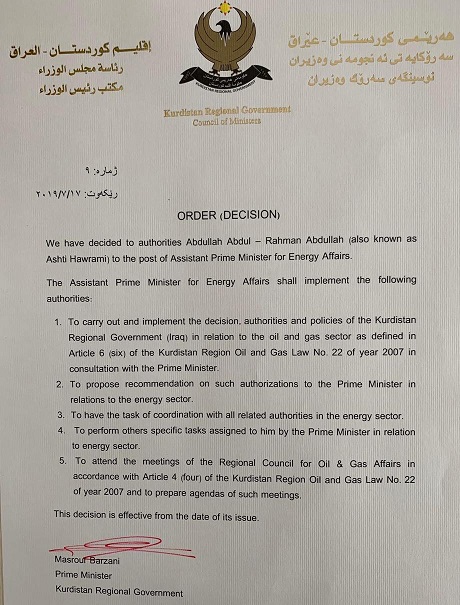Ashti Hawrami to serve as top energy official in the new KRG cabinet

In a decree dated July 17 that was signed by Prime Minister Masrour Barzani, Abdullah Abdul Rahman Abdullah, known as Ashti Hawrami, will serve as the top official for energy affairs, endowing him with a number of critical tasks.
Decree from KRG Prime Minister Masrour Barzani naming Abdullah Abdul Rahman Abdullah, known as Ashti Hawrami, as assistant to the prime minister for energy affairs. Photo: submitted
It is not currently clear whether the powers handed to Hawrami as an assistant to PM Barzani, making him the government’s top energy official, will result in the scrapping of the ministry of natural resources.
One of Hawrami’s main tasks as assistant will be to “oversee the implementation of the decisions, recommendations and policies of the Kurdistan Regional Government in the oil and gas sector” as defined by Article 6 of the 2007 Oil and Gas Law of the Kurdistan Region in consultation with the prime minister.
Hawrami will also have to present recommendations to PM Barzani in the energy sector and “coordinate between the relevant” energy authorities in the Kurdistan Region and carry out tasks delegated by the PM.
When Hawrami was first appointed minister for natural resources in 2006 the Kurdistan oil sector was still struggling to attract investment from abroad. It was ridiculed by Iraq’s central government, which told Kurdish delegations visiting Baghdad they would not even be able to extract their oil from the ground. The Kurdish delegations were repeatedly told they would not be able to explore, extract, or market their oil.
But as the rest of Iraq was mired in sectarian violence after the 2003 war, KRG officials started working on their oil and gas sector and finally introduced a business friendly oil and gas law in 2007 that opened the gates to many foreign companies including oil giants to enter Kurdistan and search for oil.
By 2007, Hawrami had held several top oil executive positions in the private sector in the United Kingdom and was well positioned to head the nascent energy sector. He was also familiar with the Iraqi oil sector as he had worked in the Iraqi National Oil Company (INOC) after his graduation from Baghdad University from 1971 to 1974.
After the initial success of attracting small to medium seized oil companies to the Kurdistan Region, the Kurds started thinking about marketing their oil. However, due to a decades long dispute with the central government, they knew they could not rely on the goodwill of Baghdad.
In order to market their oil to international traders, they first needed to transport their oil out of the landlocked Kurdistan Region. The only viable option appeared to be through Turkey. The KRG and in particular then-prime minister Nechirvan Barzani worked to improve relation with Ankara despite years of animosity between the two parties.
The construction of the pipeline was almost completed by the summer of 2013. The first shipment of oil through the pipeline was marketed in May 2014.
Hawrami is credited by industry executives and KRG officials as the driving force behind the independent Kurdish oil sector. However, he has also been criticized by opposition parties in the Kurdistan Region for the lack of transparency and accountability in the oil and gas sector. Several important public companies that the KRG had to establish as part of 2007 Oil and Gas Law were postponed. Moreover, there were several international disputes between various companies and the KRG, with the minister of natural resources absorbing the bulk of the criticism.
In his defense, Hawrami has said his job has been to make the oil and gas sector work in Kurdistan and bring in revenue for the KRG, but he should not be held responsible for what the KRG did with the oil revenues.
While disputes between Erbil and Baghdad are ongoing over the sale of oil and the share of the KRG budget from the federal government’s overall budget, the 2007 Oil and Gas Law of the Kurdistan Region outlines that the KRG and the federal government shall “agree … in the joint management of oil and gas extracted from current Fields in the Region” so long as conditions set out in Article 19 of KRG Oil and Gas Law are met, including setting up a general petroleum revenue fund for the whole of Iraq, restructuring the petroleum industry in Iraq to encourage private investment, and finally for the KRG to have a proportional role in the Federal Oil and Gas Council.
The Assistant to the Prime Minister for Energy Affairs will be required to attend meetings of the Regional Council for Oil and Gas Affairs and prepare the agenda. The Council, as such, will have an additional member in the future. Previously, it had five members: the prime minister presided over the council, the deputy PM was deputy president, while the ministers of Natural Resources, Finance and Economy, and Planning were members.
RELEVANT: The current state and future of KRG’s natural gas
Hawrami’s fate was a point of discussion earlier this month when the new KRG cabinet was approved by the parliament and prime minister omitted a candidate for the minister for natural resources.
Hawrami, who holds a PhD in Reserve Oil Engineering, has been the minister for natural resources since the post was created in May 2006. He was re-appointed in 2009 followed by a third tenure in 2012. He served under past prime ministers Nechirvan Barzani, now the Kurdistan Region president, and Barham Salih, now the Iraqi president.
KRG Prime Minister Masrour Barzani had indicated his administration aims to “develop a constructive and stable partnership” with Baghdad, a welcoming sign at a time that the wider Middle East region is going through a tumultuous time as tensions between the US and Iran rise.
With Adil Abdul-Mahdi approaching his first anniversary as Iraq’s prime minister, the appointment of Hawrami indicates some progress in settling disputes between Baghdad and Erbil.

